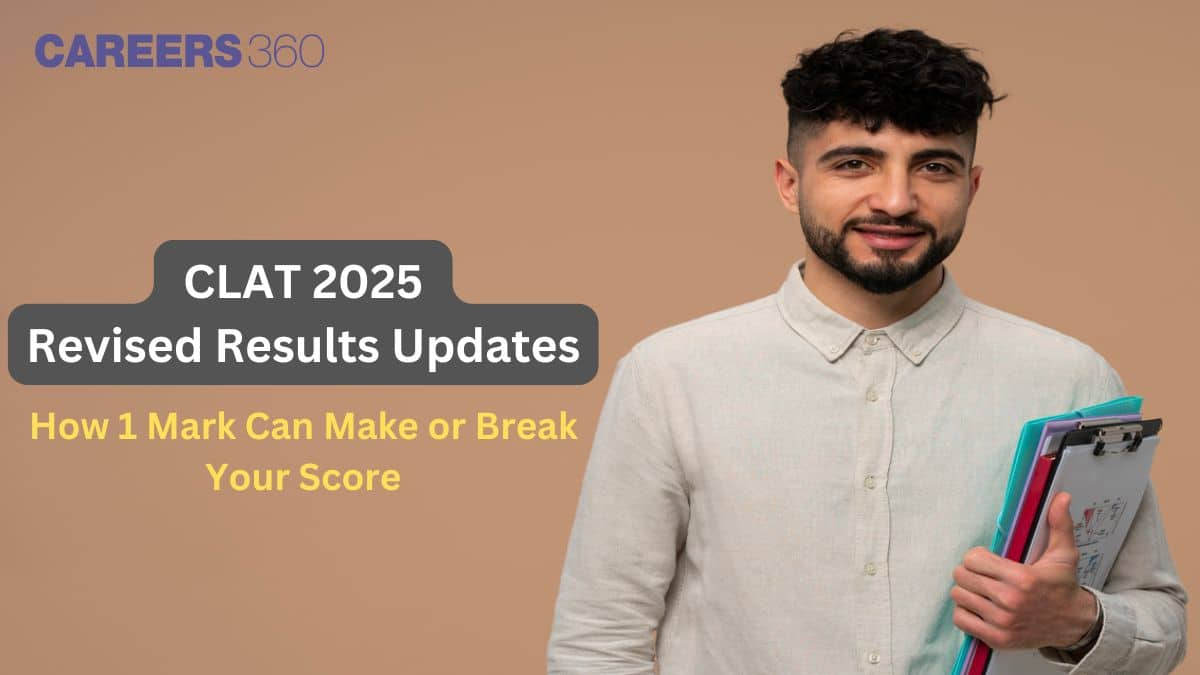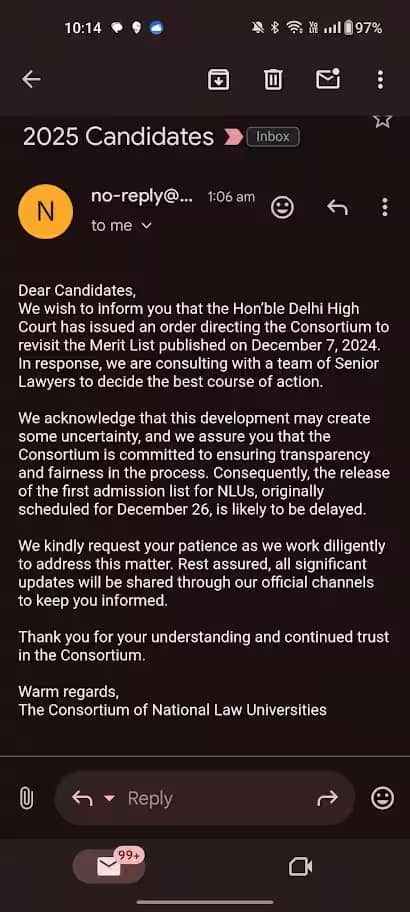Jindal Global Law School Admissions 2026
Ranked #1 Law School in India & South Asia by QS- World University Rankings | Merit cum means scholarships | Early Admissions (Pahse 2) Deadline: 28th Feb’26
After the Delhi High Court’s judgment on CLAT 2025 asking the consortium to revisit the CLAT results, the students now wonder if it can really impact their score and rank. Given the limited intake in the national law universities and the intense competition for these universities, one mark can have a significant impact on candidates’ ranking and admission chances in NLUs. This article discusses how and to what extent this judgment is likely to impact the CLAT results 2025, and whether the consortium would explore the possibilities of challenging it in the Supreme Court.

The judgment will have implications on your CLAT rank and counselling schedule if the consortium doesn't challenge it in the Supreme Court.
Lets try to understand the judgment and its impact in 10 points
The final answer key was challenged. Specifically, question number 14, 27, 67, 68 and 100 from SET A were challenged.
Ranked #1 Law School in India & South Asia by QS- World University Rankings | Merit cum means scholarships | Early Admissions (Pahse 2) Deadline: 28th Feb’26
Among top 100 Universities Globally in the Times Higher Education (THE) Interdisciplinary Science Rankings 2026
Questions Challenged from Set A | |
Question | Disputed Answers |
Question 14 | I. Answer as per provisional key:- D |
II. Answer as per Final Answer Key:-D (Sellers of Stolen Hardware) | |
III. Answer of the Petitioner-: C (Auctioneers of cheap Bags) | |
Question 37 | I. Answer as per provisional key -: D |
II. Answer as per Final Answer Key-: D | |
III. Answer of the Petitioner-: C | |
Question 67 | I. Answer as per provisional key -: B |
II. Answer as per Final Answer Key-: B (A voidable agreement) | |
III. Answer of the Petitioner-: C (A void agreement) | |
Question 68 | I. Answer as per provisional key -: C |
II. Answer as per Final Answer Key-: C (An agreement to pay 10 lakhs on getting a government job) | |
III. Answer of the Petitioner-; D (A contract with a minor who understands the terms) | |
Question 100 | I. Answer as per provisional key - B |
II. Answer as per Final Key -: D (Data inadequate) | |
III. Answer of the Petitioner-: B | |
From these, on Question no 14, the court agreed with the petitioner that option C was the correct answer, so one mark will be awarded to all those who choose option C.
On Question number 100, the court directed the consortium to withdraw the question as the correct answer Sohan was not among the answer options. As per the final answer key released by the consortium, Option D, " Data Inadequate" was the correct answer. Now that the question is withdrawn, candidates who marked option D will lose one mark from their CLAT 2025 score. Candidates who marked any other option other than D will gain 0.25 marks.
All remaining objections were rejected. So the marks will be revised only for questions number 100 and 14.
Following this judgment, the Consortium has sent an email communication to candidates that the release of the first admission list which was scheduled for December 26 is likely to be delayed. Meanwhile, they are also consulting a team of senior lawyers to decide on the future course of action.
Last Date to Apply: 25th Feb | Ranked #18 amongst Institutions in India by NIRF | Ranked #1 in India for Academic Reputation by QS Rankings | 16 LPA Highest CTC
India's Largest University | BCI approved | Meritorious Scholarships up to 5 lacs |

As of now, there is no clarity from the consortium on whether the result will be revised. However, in case of revision, it is likely to impact your rank
What does one mark mean: given the intense competition among students, one mark can significantly affect your rank in CLAT 2025.
If we look at the previous year's merit list, at 89 marks, the candidate got a CLAT rank of 1379, however, if added just one mark, the rank can go 1102. A difference of almost 277 rank, it can place you in an NLU of your choice.
CLAT Marks | Corresponding Rank |
89 | 1379 |
90 | 1102 |
Difference | 277 |
Since a majority of students secure below 70 marks, the previous merit lists suggest that one mark can make an impact of around 1000 rank. Let's try to understand this from last year’ example - a candidate who got 65 marks got 15532 rank, whereas, at 66 mark, another candidate got 14626 marks. This is a difference of 906 ranks and can significantly change your NLU admission chances.
CLAT Marks | Corresponding Rank |
65 | 15532 |
66 | 14626 |
Difference | 906 |
Finally, the CLAT counselling schedule is likely to be impacted. More candidates are expected to be invited for counselling and the NLU choice filling window may reopen.
Question no 100, which is likely to be removed from the final evaluation will not result in any additional marks for candidates. However, it may reduce the total marks of candidates by 1 mark if they were correct according to the final answer key of CLAT 2025. Further, candidates who got a penalty of 0.25 marks from this question get the benefit of this question removed from the question paper as it will be withdrawn for all candidates.
There is another case in Rajasthan High Court on the grievances not being addressed by the Consortium in a timely manner. The court has sought a response from the consortium on the next hearing scheduled on January 08.
On Question asked by student community
Hi, you can apply for admissions in Nirma University, NFSU Ahemdabad, Alliance, IPU University and affiliated instiutes (in case you are reserved category candidates), UPES Dehradun, BITS Law School etc.
Start preparing for CLAT by first understanding the exam pattern and syllabus, which includes English, Current Affairs, Legal Reasoning, Logical Reasoning, and Quantitative Techniques. Make a simple daily routine and begin with basics read newspapers regularly for current affairs, practice comprehension passages for English and legal sections, and solve basic
Hello,
With a CLAT AIR of 33599 and SC category rank of 2103, and being a Delhi domicile, your chances at IP University (GGSIPU) are moderate to good, especially in later counselling rounds.
Based on previous year trends, some IPU-affiliated law colleges have closed at higher SC category ranks, so
Hello
With an AIR of 9076 and EWS rank of 846 in CLAT 2026, getting a top NLUs is unlikely, which is why you didn’t get a seat in the first round. However, you still have some chances in lower-tier NLUs like NLU Odisha, NLU Assam, NLU Tripura, NLU Meghalaya,
Hello
With a CLAT 2026 score of 60.75, AIR 17,715, and OBC-NCL rank 3,347 as an out-of-Delhi candidate, getting a seat in the Faculty of Law, Delhi University is very unlikely. DU’s cut-offs for OBC candidates are usually much higher, even in later rounds. You should keep backup options like
Among top 100 Universities Globally in the Times Higher Education (THE) Interdisciplinary Science Rankings 2026
NAAC A++ Accredited | Ranked #11 by NIRF
NAAC A+ Accredited | Among top 2% Universities Globally (QS World University Rankings 2026)
#14 in India by NIRF Ranking | NAAC A++ accredited | Approved by BCI | Scholarships Available
Excellent curriculum; an impressive range of electives, besides core law courses. Up to 100% merit scholarship on a first-come, first-served basis
Last Date to Apply: 25th Feb | Ranked #18 amongst Institutions in India by NIRF | Ranked #1 in India for Academic Reputation by QS Rankings | 16 LPA Highest CTC